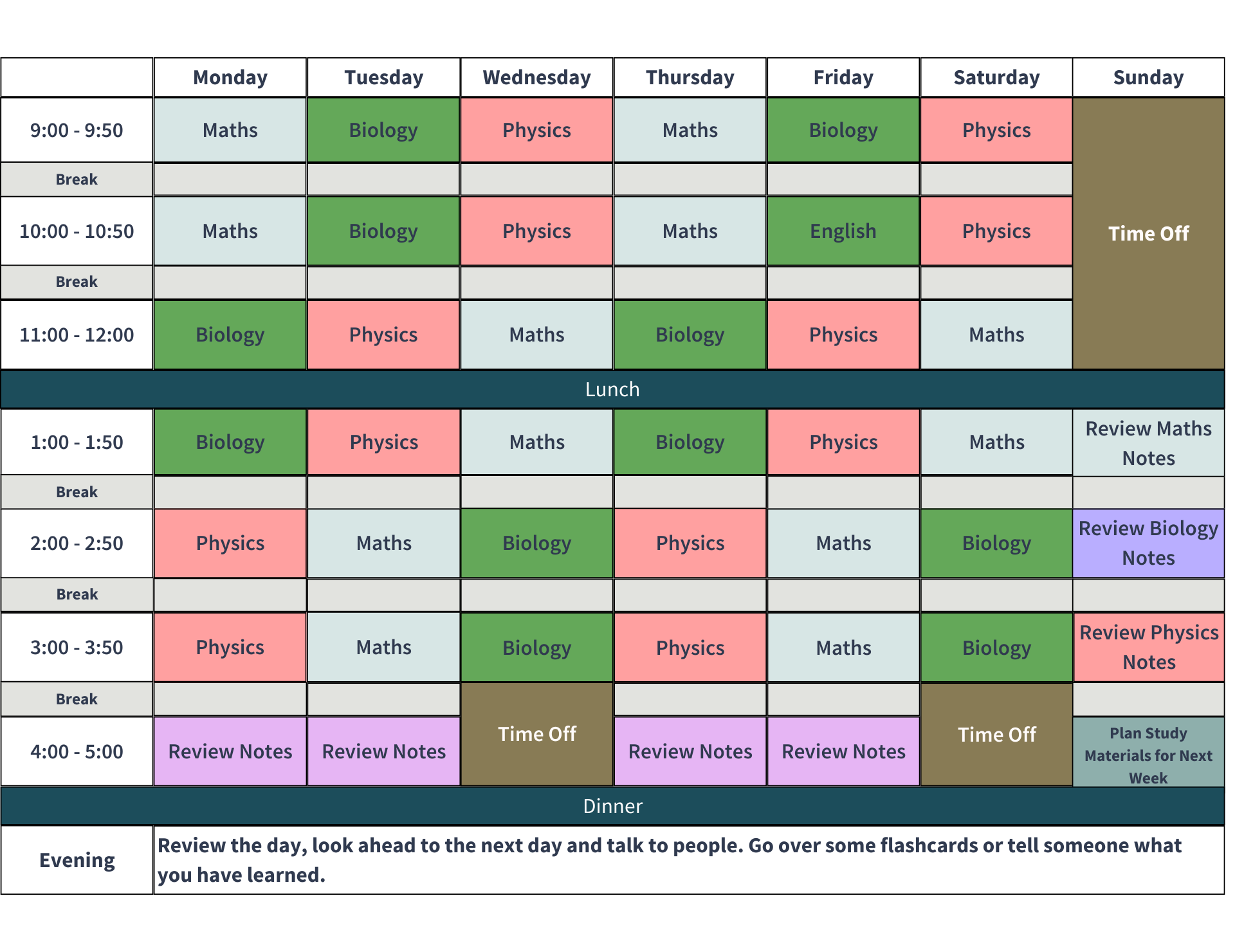
A Level Revision Timetable: Why do I need one?
An effective A Level revision timetable will ensure you have a plan to cover your three main topics thoroughly. You will have been studying for nearly two years, and a timetable will help prevent you from feeling overwhelmed by the task of revisiting and recapping all that learning.
It is essential to start your revision planning early and to stay organised to give you a sense of control. This guide will help you create a revision timetable that works for you, with tips on planning, setting goals, and managing your time.
If you need support with your A Level revision, our expert tutors can help.
Submit an enquiry today!
Benefits of Using an A Level Revision Timetable
- You will feel great achievement as you work through it and bring together everything you have learned.
- It will help ensure you have not missed out on any topics
- It will help you spread your revision over the time available and avoid last-minute cramming
- It will help you make the best use of your time, including time for rest and recreation.

Questions to Ask Yourself Before Creating an A Level Revision Timetable
- How much time is there before the start of the exams – do you know the date of your first exam?
- Make a list of all the topics you need to cover for each of your subjects you are studying for your A Levels– it is surprisingly easy to forget one and have to make up time for it later. Break them down into topics and papers.
- Ask yourself, which subjects and topics do you find most challenging? Prioritise topics where you feel you may have gaps in your knowledge.
- Are there specific topics or areas within subjects that you feel less confident about and might need a different approach or a little extra time?
- Do you have a preferred study method? Do you like to work alone or with friends; do you like to use online resources or your own notes from class?
- Do you have any extra-curricular activities or commitments you need to factor in? A regular sporting activity or a visit to family.
- What time of day do you find most productive for study? Are you an early bird or do you prefer to start the day doing something different before settling to study?
3.0 Top
How to Create a Revision Timetable
We all have our own preferences for exactly how and when we want to study. The key is to decide what works best for you and to devise a timetable that will support your study and revision style. The suggestions in this guide will help you create a pathway that suits you.
Availabilities
The amount of time you have for revision in a week will vary considerably and you will need separate timetables for school term time and for the holidays. Even if you are not an early bird, it is a good idea to start by 9.00am during the holidays. Exams often start at 9.00 so it is a good habit to develop to be studying early.
Goal Setting
Set yourself realistic goals. Prioritise the subjects and topics you feel less confident about and allocate enough time to go over topics more than once, to recap and relearn where necessary. If you are still attending lessons, you may be taking on new information right up to the end. Make sure you know how marks are allocated in the exams.
Subject Focus
Don’t try to cover too many topics in one session but plan to go back and revisit your learning. When you start planning, make sure you know all the topics and papers for each subject so that nothing is left out. If you have chosen three subjects for you A Levels, for example, then allocate your time appropriately and don't spend too long or too little on a subject and topic.
If you are spending an evening revising, then we recommend focussing on one subject only, and sticking to just one or two topics.
If you have a whole week, say, a half-term, or a whole afternoon off to study, then we recommend varying your revision by covering multiple subjects in a session to avoid burnout.
Commitments
Block out any regular commitments and don’t forget those one-off promises to visit family, finish some chores, walk the dog. Although perhaps someone will help you with your chores while you are revising for your A Level exams!
Breaks
As well as regular commitments, it is important to schedule in regular breaks and some fun activities. If you are working at a desk, get up regularly for a stretch, make a drink, talk to someone for 5 minutes, walk round the garden. If you plan your day carefully and are organised you can still fit in some much-needed down time. Remember to rest and try to eat healthily.
Topics Already Tackled
Don’t forget to allocate some time to go back over topics you have already revised. It is much better to revisit your learning than to cram a subject for two days and never look at it again. This is also when flashcards and other revision aids can be helpful as well – a few minutes every day looking over notes for key topics in each subject will help everything sink in.
Colour Coding
Colour is key! Using different colours for each subject will make the timetable easier to read and understand. You will be able to see at a glance what is on your schedule, when you will next be studying a particular subject, how many sessions you have planned for each subject.
You can even allocate your favourite colours to your favourite subjects - which is what we've done for our A Level revision timetable template.
4.0 Top
A Level Revision Timetable Template
There are many different places to create a free timetable online. You can see the timetable we've made below, which you can DOWNLOAD FOR FREE
However, you can always create your own! Whether by drawing it out by hand or using Microsoft Office tools.

5.0 Top
How to Use Our Timetable Template
1. Start by counting the number of whole days left and multiplying by the number of sessions you want to have in a day. For example, if you have 10 days and are planning 6 hour-long sessions in a day, multiply 10 x 6 = 60.
2. You have 60 revision sessions which you can allocate to your subjects. You may want to prioritise and give more hours to some – this is where you will need to think carefully about what you need to cover, but make sure you don’t squeeze anything out completely.
3. Now start to fill in the slots on your timetable – remember those colours! You may need a few attempts at this to make sure everything is included, but that’s OK – this is your timetable. There may be other days when you know you will only have a couple of hours – perhaps timetable some quick flashcard revision, or an online quiz, or just focus on one subject you feel needs a little extra.
4. Go back to your timetable at least once a week and think about what you have achieved and whether you need to adjust anything for the next week.
6.0 Top
Strategies for Effective Revision
Once you have made your A Level timetable, have ensured that you have included all your subjects, allowed for revisiting topics and included breaks, here are some revision strategies you can use to help you make the best use of that time.
- Active learning: Don’t just sit and read your books and notes. Make flashcards, explain a concept to a family member, stick post-it notes around your room, use coloured pens for different topics
- Practice questions: Use exam style questions to test your understanding and make sure you can apply what you have learned
- Past papers: Make sure you are familiar with the format for each subject, and the types of questions asked.
- Interleaving: Return to topics to reinforce learning. I have “interleaved” this idea several times, so I hope it sticks!
7.0 Top
FAQs
There really is no easy answer to this one. During term time, you will have homework to complete, but an hour or two a day of revision every day of the week will help ensure you stay on top of your schedule. During the holidays, and at weekends, you will be able to work more hours. A good target to set yourself is seven hours, but if you feel that is unrealistic, aim for at least five.
As soon as possible. The earlier you get into a routine of revising what you have learned, the better.
This will depend on your personal learning style and the time available. At times you will do a few hours of revision in a day, but then make sure you get up, move around, take short breaks. If you have limited time, spend a few minutes going through your flashcards or ask a friend or family member to ask you questions based on your notes. Remember that in the exams you will have to sit and concentrate for prolonged periods of time – over two hours for some English papers – so it is good practise to revise for longer periods.
Don’t panic! Step back, take a bit of time to review the time left and prioritise the topics and subjects you feel you need to. Your timetable is a tool to help you, so take control and make it work for you.
8.0 Top
Conclusion
We hope you find this guide to creating a revision timetable helpful. You have worked hard for two years; now is the time to show off what you have learned. A revision timetable is just one tool that can help you make the most of your study time, but an important one.
If revision can sometimes seem overwhelming, a clear plan helps you feel in control and stay on top of things. If you feel it is all getting too much, talk to someone—a parent, teacher, or friend—and take a break and come back refreshed.
At Ivy Education, we provide Expert A Level Tuition which can be a great way to reset your learning and perhaps see things in a slightly different light.
Other Articles

A Level Grades Explained

What are A-levels?

Hardest A Levels 2025

How to Revise for A Levels

IB or A Levels: Which is the Right Choice?

The UK Education System Explained - 2025

What is Oxbridge: A Guide

How to get into Oxford University

How to Get Into Cambridge University
As featured in










